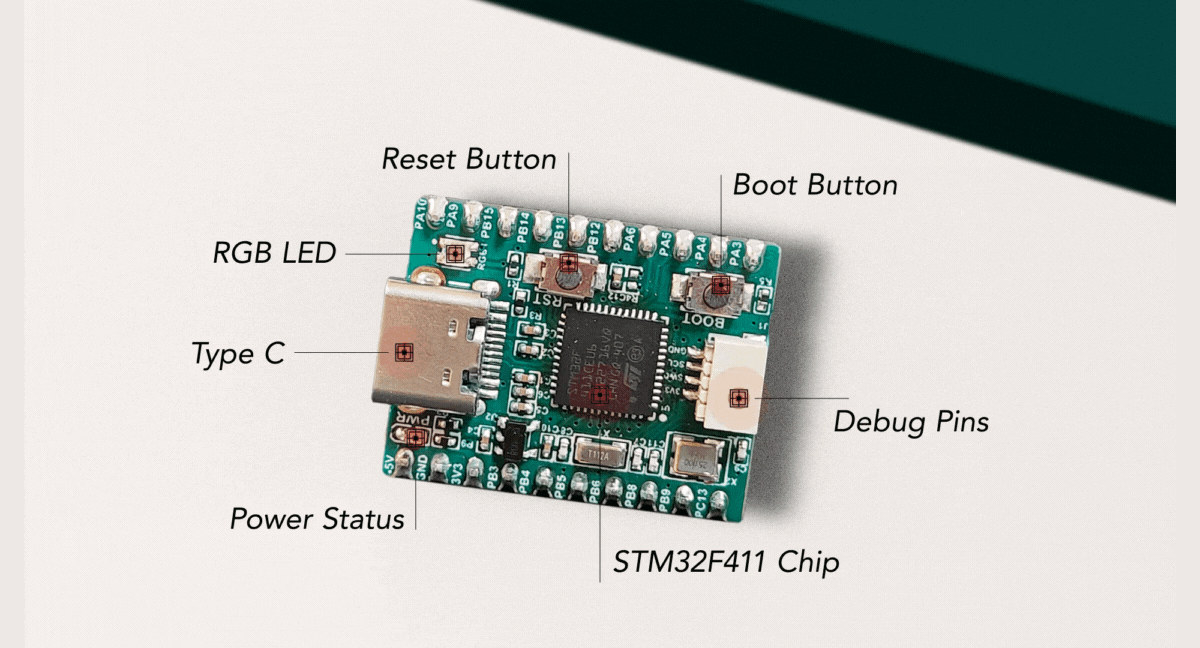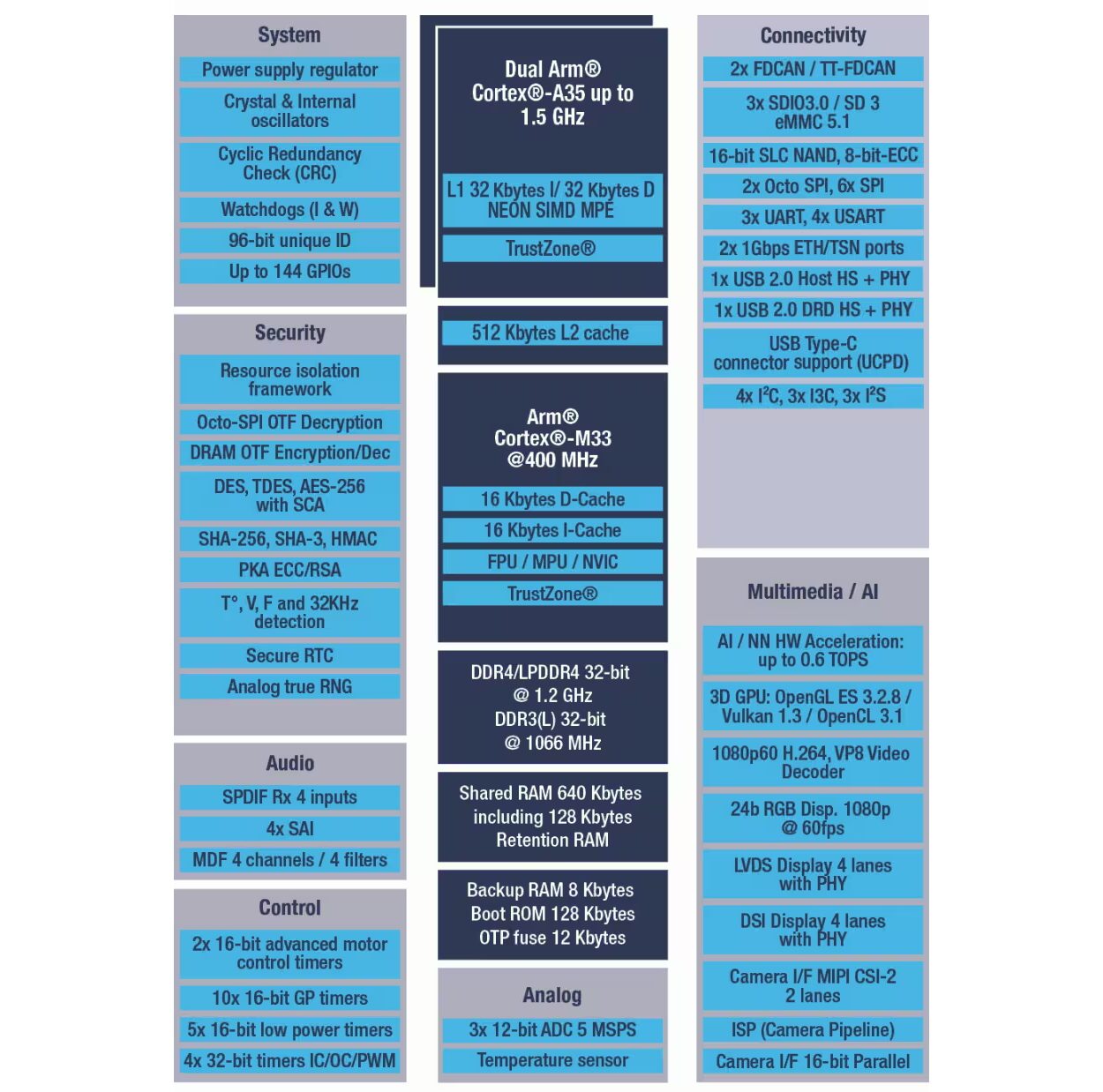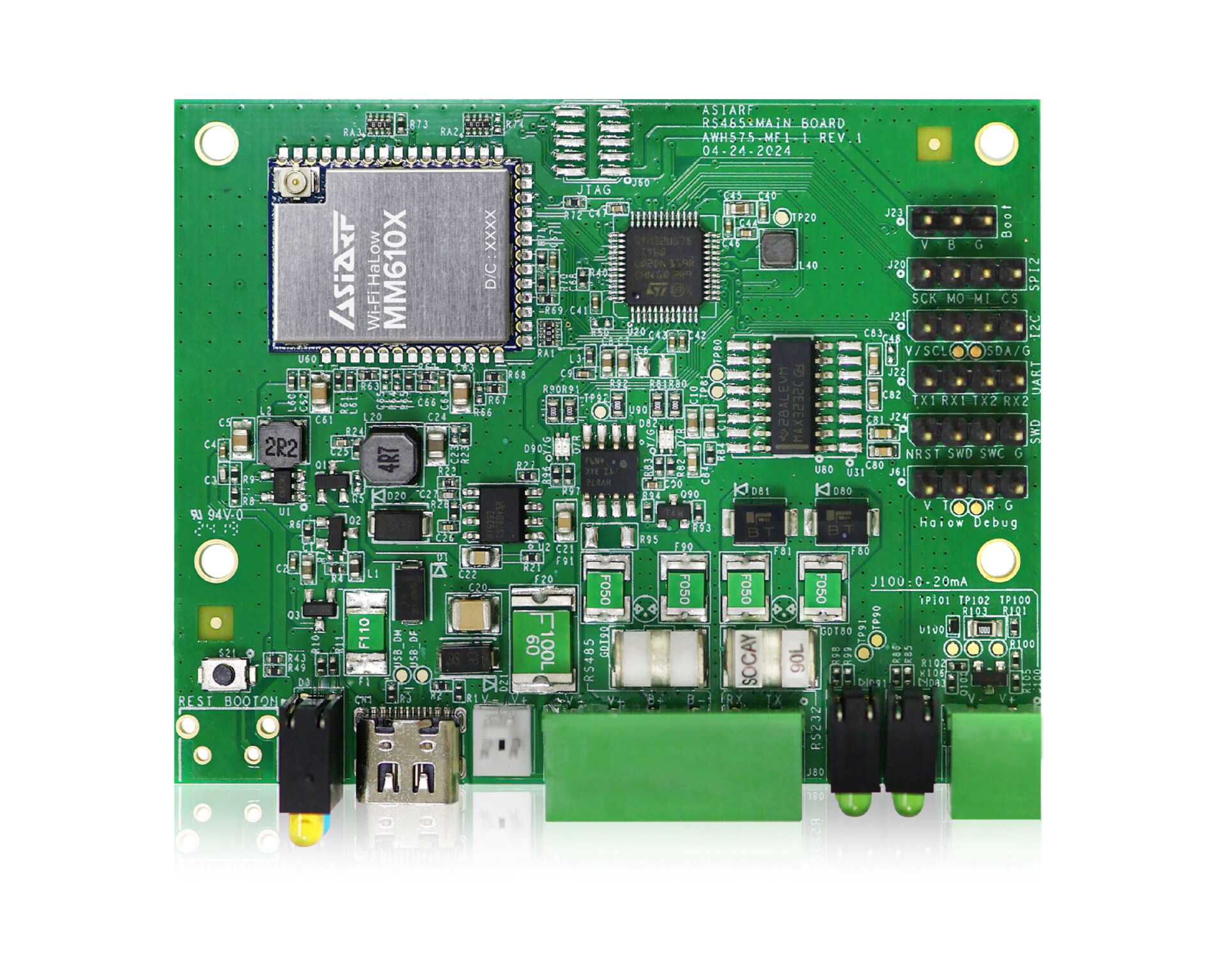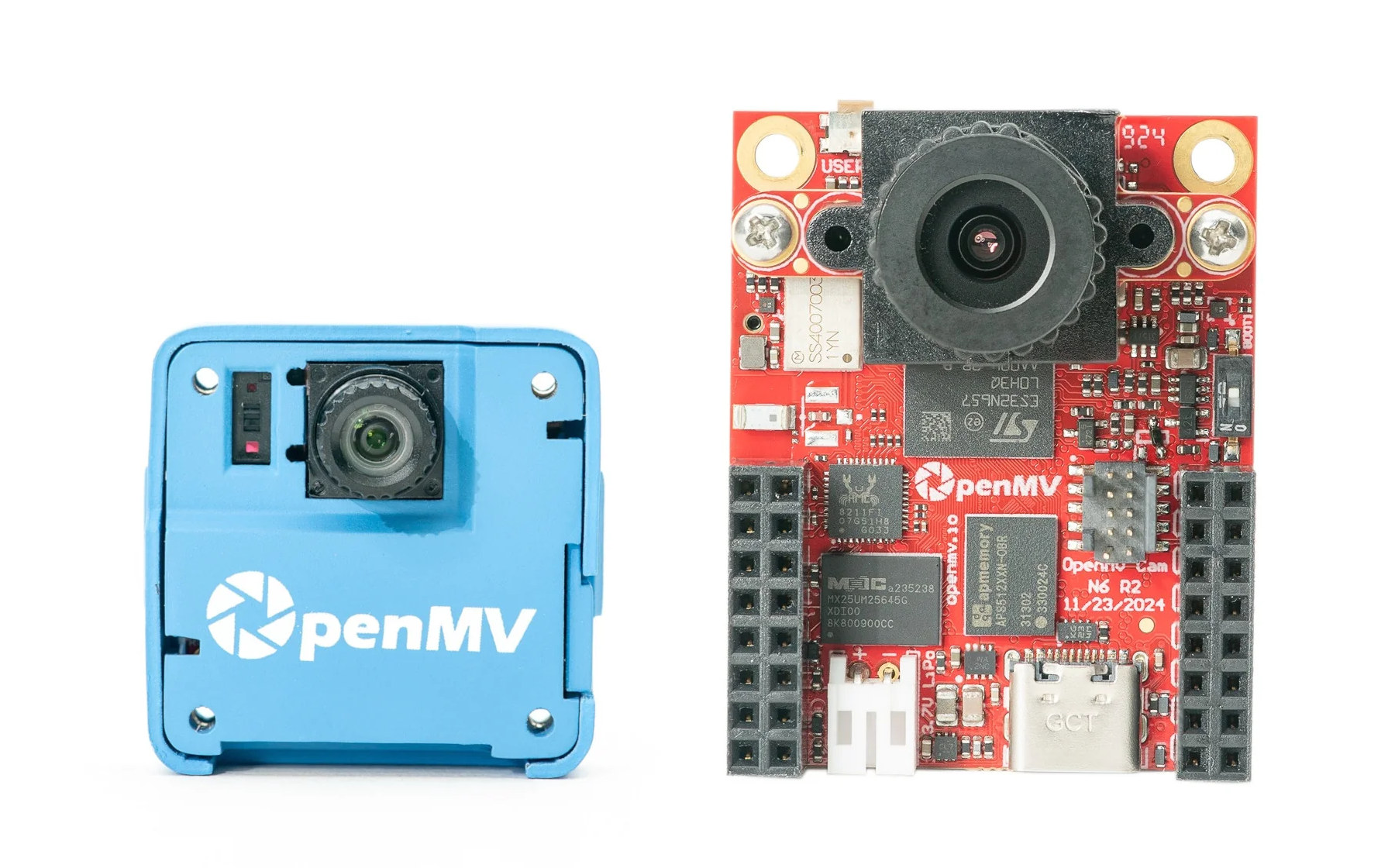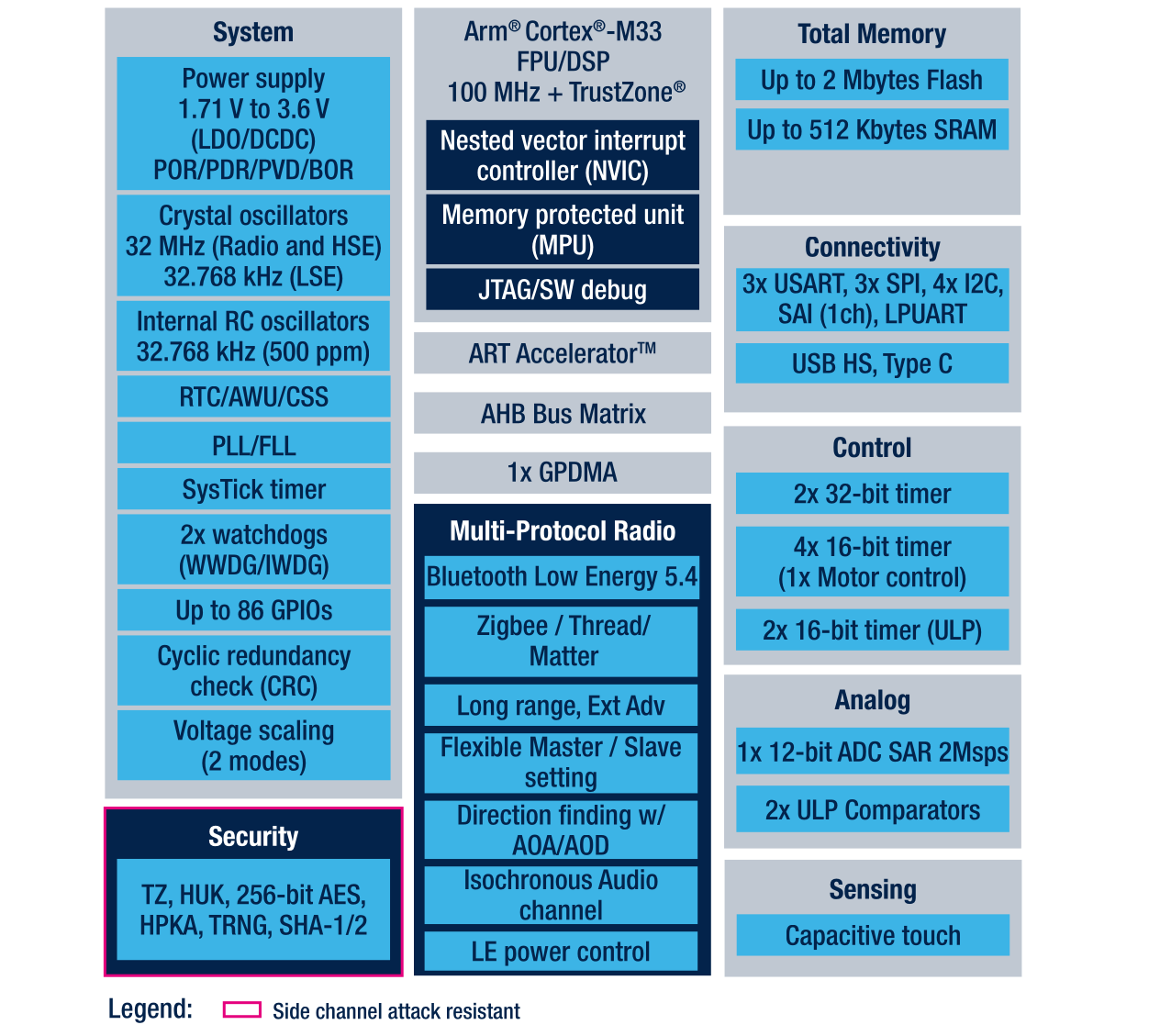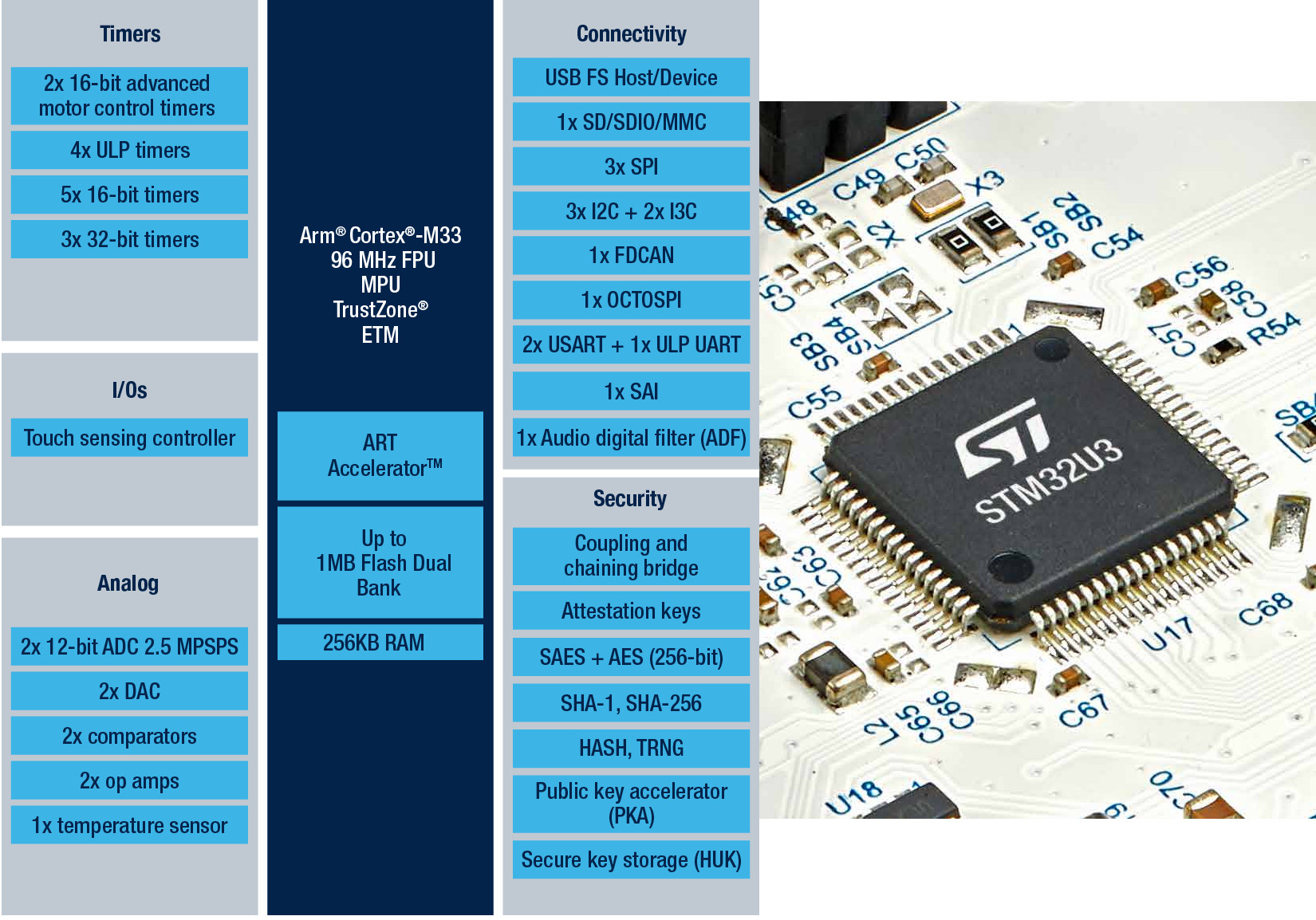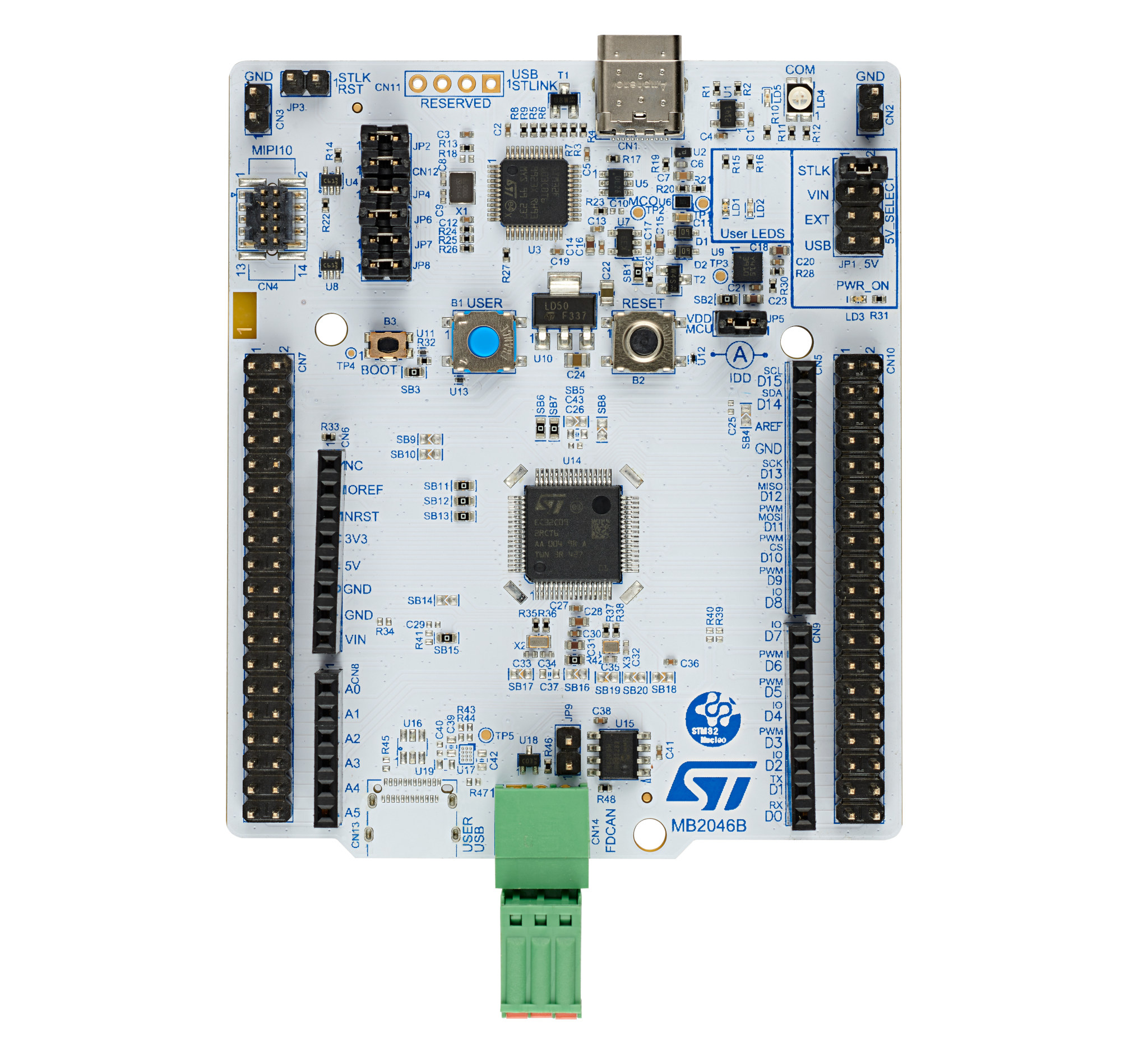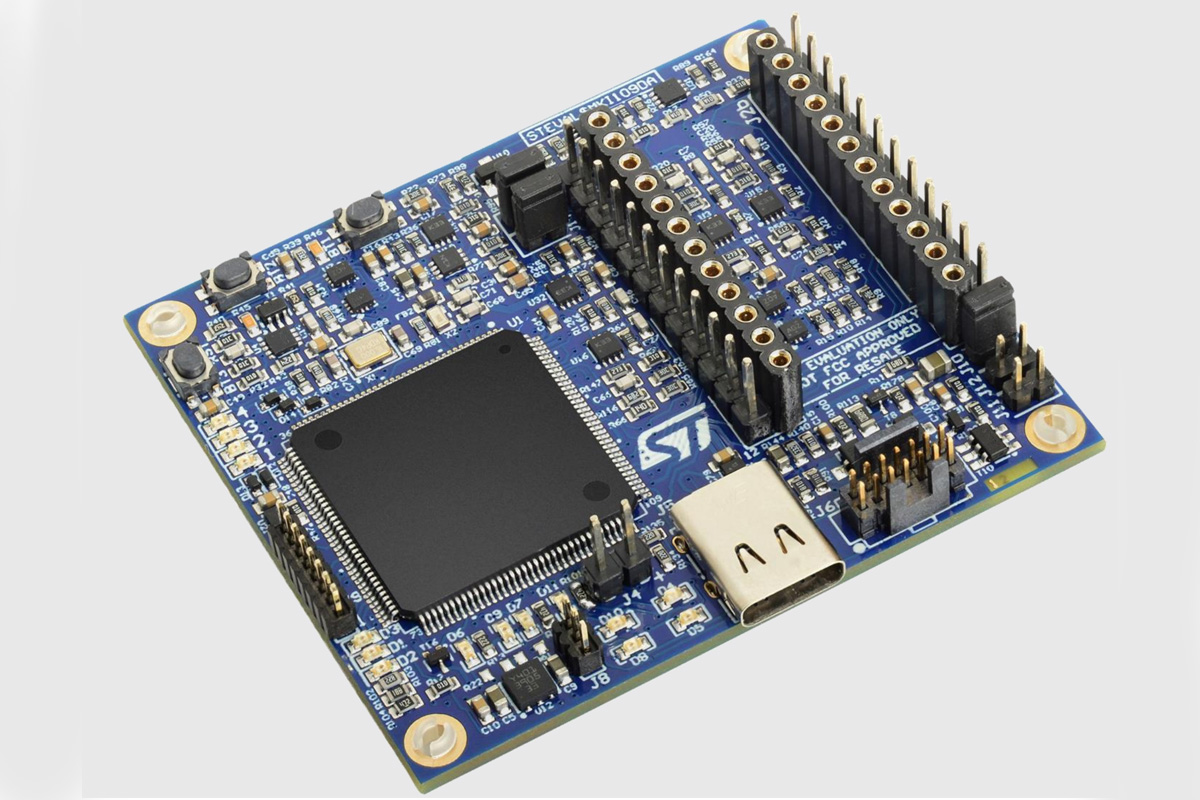Xero MCU is a small STMicro STM32F411 Arm Cortex-M4F microcontroller board with a USB-C port, twenty through and castellated holes for GPIOs, a Debug connector, Reset and Boot buttons, and a few LEDs. The 100 MHz MCU embeds 512KB flash and 128KB SRAM, and the board is said to be designed for hobbyists, students, and professionals. For reference, the Xero MCU board features the same STM32F411CEU6 microcontroller found in the Black Bill board. However, it’s quite shorter at about half the size, and features castellated edges, making it suitable for soldering on a baseboard. Xero MCU specifications: Microcontroller – STMicro STM32F411CEU6 Arm Cortex-M4F MCU @ 100MHz with 512KB Flash, 128KB SRAM USB – 1x USB Type-C port for power and programming Expansion – 2x 20-pin through and castelled holes with up to 17x GPIO, I2C, 2x SPI, 2x UART, 4x ADC, 5V, 3.3V, and GND Debugging – 4-pin debug connector […]
STMicro STM32MP23 Cortex-A35/M33 MPU features a 600 GOPS NPU for industrial IoT and ML applications
STMicroelectronics STM32MP23 is a dual-core Cortex-A35 general-purpose microprocessor (MPU) with a Cortex-M33 real-time core, and 600 GOPS of performance operating at up to 125°C and designed for industrial and Internet-of-Things (IoT) edge computing, advanced HMI, and machine-learning (ML) applications. It follows the STM32MP25 series unveiled in 2023 and launched the following year as the first member of the STM32MP2 family. The STM32MP23 is a cost-down version of the STM32MP25 with similar specifications (and pin-to-pin compatible packages), but the new family has a weaker 0.6 TOPS NPU, and tops at two Ethernet ports for the high-end parts instead of three. Ditto for CAN Bus interfaces (2x vs 3x). Other changes include a 16-bit memory interface and the lack of PCIe and USB 3.0 interfaces. STM32MP23 specifications: CPU – Single or dual Arm Cortex-A35 cores running at up to 1.5 GHz or 1.2 GHz with 512KB L2 cache Real-time MCU – Arm […]
AsiaRF AWH575-MF1 WiFi HaLow industrial IoT controller offers RS232, RS485, I2C, SPI, UART, and ADC interfaces
AsiaRF AWH575-MF1 is a WiFi HaLow industrial IoT controller / remote control kit with RS232, RS485, I2C, SPI, UART, and 12-bit ADC interfaces to connect sensors or actuators and designed for long-range, low-power M2M communication. The board is comprised of an STMicro STM32U5 Cortex-M33 microcontroller to handle I/Os and communicate with an MM6108 WiFi HaLow (802.11ah) module made by AsiaRF. The board takes power from a USB-C port or optionally from a terminal block supporting a wider 9V to 24V DC input. AsiaRF AWH575-MF1 specifications: MCU – STMicro STM32U585CIT6Q CPU – Arm Cortex-M33 core @ 160 MHz Memory – 786 KB SRAM Storage – 2MB Flash Wi-Fi HaLow AsiaRF 802.11ah module based on Morse Micro MM6108 chipset Frequency Range – 902MHz to 928MHz Channel bandwidth – 1/2/4/8MHz Data Rate – Single-stream max data rate of 10 Mbps Transmit Power – 21dBm +/-2dBm @ MCS 0 Modulation – BPSK/QPSK/16 QAM/64 QAM […]
MicroPython-programmable OpenMV N6 and AE3 AI camera boards run on battery for years (Crowdfunding)
OpenMV has launched two new edge AI camera boards programmable with MicroPython: the OpenMV AE3 powered by an Alif Ensemble E3 dual Cortex-M55, dual Ethos-U55 micro NPU SoC, and the larger OpenMV N6 board based on an STMicro STM32N6 Cortex-M55 microcontroller with a 1 GHz Neural-ART AI/ML accelerator. Both can run machine vision workloads for several years on a single battery charge. The OpenMV team has made several MCU-based camera boards and corresponding OpenMV firmware for computer vision, and we first noticed the company when they launched the STM32F427-based OpenMV Cam back in 2015. A lot of progress has been made over the years in terms of hardware, firmware, and software, but the inclusion of AI accelerators inside microcontrollers provides a leap in performance, and the new OpenMV N6 and AE3 are more than 100x faster than previous OpenMV Cams for AI workloads. For example, users can now run object […]
STMicro STM32WBA6 2.4 GHz wireless MCU gets up to 2MB flash, 512KB SRAM, USB OTG, and more
STMicro had two announcements yesterday. I’ve already covered the launch of the ultra-low-power STM32U3 microcontroller family, so today, I’ll check the new 100 MHz STM32WBA6 Cortex-M33 wireless MCU family with 2.4GHz radios for Bluetooth LE 6.0, Zigbee, Thread, and Matter designed for wearables, smart home devices, remote weather sensors, and more. The STM32WBA6 is an evolution of the STM32WBA family introduced last year, especially of the STM32WBA54 and STM32WBA55 with many of the same features SESIP (Security Evaluation Standard for IoT Platforms) Level 3 security certification, but gets more memory and flash with up to 512KB of SRAM and up to 2MB of flash. The new STM32WBA6 family also gains a High-Speed USB OTG interface and extra digital interfaces such as three SPI ports, four I2C ports, three USARTs, and one LPUART. STMicro STM32WBA6 key features and specifications: MCU core – Arm Cortex-M33 at 100MHz with FPU and DSP Memory […]
STMicro STM32U3 ultra-low-power Cortex-M33 MCU achieves 117 Coremark/mW in active mode, consumes 1.6 µA in stop mode
STMicro STM32U3 is a new family of Arm Cortex-M33 microcontrollers clocked at up to 96 MHz with ultra-low-power consumption designed for utility meters, healthcare devices such as glucose meters and insulin pumps, and industrial sensors. The company says the STM32U3 MCU family is a “market leader in terms of efficiency” with 117 Coremark/mW in active mode, and consumes 1.6µA in stop mode. The Coremark/mW score means the STM32U3 offers almost twice the efficiency of the STM32U5 series, and five times that of the STM32L4 series. Other highlights include up to 1MB of dual-bank flash, 256kB of SRAM, and various interfaces like MIPI I3C, SAI audio, 12-bit ADC, etc… STMicro STM32U3 key features and specifications: MCU Core 32-bit Arm Cortex-M33 CPU @ 96 MHz with TrustZone and FPU Performance 1.5 DMIPS/MHz (Dhrystone 2.1) 387 CoreMark (4.09 CoreMark/MHz) 500 ULPMark-CP 117 ULPMark-CM 202000 SecureMark-TLS ART Accelerator with DSP instructions Memory/Storage 256 KB […]
STMicro expands the STM32C0 Cortex-M0+ MCU family with STM32C051, STM32C091, and STM32C092 (with CAN FD)
STMicro first introduced the STM32C0 32-bit Arm Cortex-M0+ MCU family as an 8-bit MCU killer in 2023, followed by the STM32C071 adding USB FS and designed for appliances with graphical user interfaces (GUI). The company has now added three new parts with the STM32C051, STM32C091, and STM32C092. The STM32C051 is similar to the original STM32C031 but adds more storage (64KB vs 32KB) and is offered in packages with up to 48 pins, while the STM32C09x parts offer flash densities up to 256 KB in packages up to 64 pins, and the STM32C092 also gains a CAN FD interface. The STM32C09x parts can be seen as an update to the STM32C071 where more flash memory is needed. That’s 30 new SKUs bringing the total to 55 when different packages and flash memory size/RAM size options are taken into account. The STM32C051 offers the same maximal amount of SRAM as the STM32C031 […]
STMicro’s STEVAL-MKI109D evaluation board supports all ST MEMS sensors with a DIL24 socket
STMicroelectronics has introduced the STEVAL-MKI109D a MEMS sensor evaluation board, designed to test and optimize STMicro’s MEMS sensors for various applications, including industrial automation, smart agriculture, and consumer electronics. Built around the STM32H563ZI Arm Cortex-M33 MCU this development board features I²C, I3C, and SPI interfaces, along with a TDM interface for high-speed sensor data communication. The board is also compatible with STMicro MEMS DIL24 adapter boards, which makes it easy for engineers to test different sensors. Additionally, it has software-adjustable power circuitry (0–3.6V), and onboard power monitoring for accurate analysis of sensor performance. STEVAL-MKI109D specifications Main MCU – STMicro STM32H563ZI Arm Cortex-M33 MCU with DSP and FPU Storage – MicroSD card slot Sensors – Supports all STMicro MEMS DIL24 compatible adapter boards Interfaces – I²C, I3C, SPI, TDM USB – USB Type-C connector for power and programming Misc Onboard J6 connector for STM32 programming and debugging Onboard J9 connector for […]


